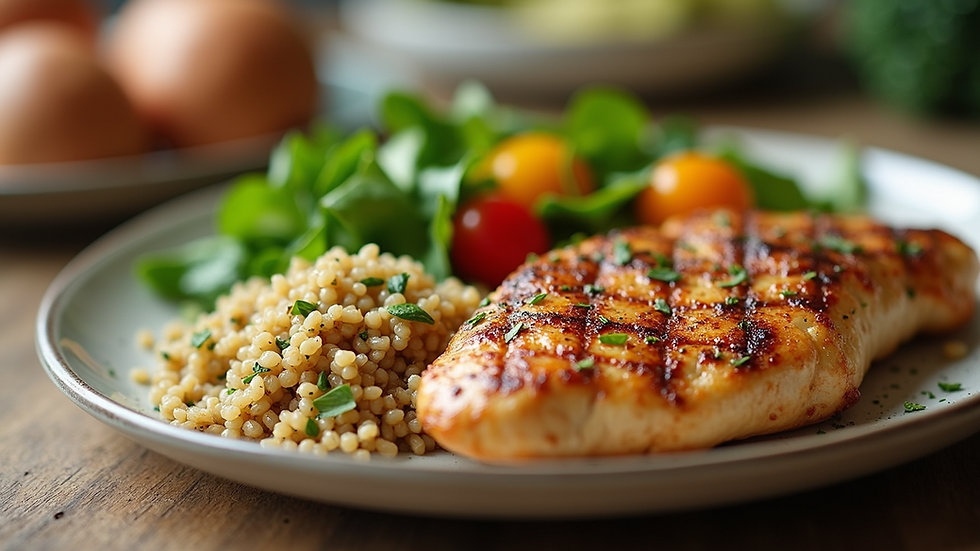Fuel Your Strength: Nutrition Tips for Lifters
- shevizeff
- Aug 14, 2025
- 4 min read
Updated: Sep 10, 2025
Lifters know that training hard is only part of the equation. To truly excel, they must also focus on nutrition and recovery. The right foods can fuel performance, enhance recovery, and support overall health. In this post, we will explore essential nutrition tips that can help athletes maximize their strength and performance.
Understanding the Basics of Sports Nutrition
Nutrition is the foundation of athletic performance. It provides the energy needed for training and competition. Athletes require a balanced diet that includes carbohydrates, proteins, and fats. Each macronutrient plays a unique role in fueling the body.
Carbohydrates: The Primary Fuel Source
Carbohydrates are the main source of energy for athletes. They are stored in the muscles and liver as glycogen. When you exercise, your body uses glycogen for energy.
Complex Carbohydrates: Foods like whole grains, fruits, and vegetables provide sustained energy. They are digested slowly, keeping energy levels stable.
Simple Carbohydrates: Foods like fruits and honey can provide quick energy. They are useful for quick recovery after intense workouts.
Proteins: Building Blocks of Muscle
Protein is essential for muscle repair and growth. After intense training, muscles need protein to recover.
Lean Meats: Chicken, turkey, and fish are excellent sources of protein.
Plant-Based Proteins: Beans, lentils, and tofu are great options for vegetarians and vegans.
Fats: Essential for Energy and Health
Fats are also important for athletes. They provide a concentrated source of energy and support cell function.
Healthy Fats: Avocados, nuts, and olive oil are good choices. They help reduce inflammation and support heart health.
Timing Your Nutrition
When you eat is just as important as what you eat. Timing your meals and snacks can enhance performance and recovery.
Pre-Workout Nutrition
Eating before a workout can provide the energy needed for optimal performance. Aim to eat a balanced meal 2-3 hours before exercising. If your sessions are long, high in intensity or otherwise fasted, you may also benefit from pre-workout carbohydrates (0.5-1g/kg)
Example Meal: A bowl of oatmeal topped with banana and a sprinkle of nuts.
Example pre workout carb: 50g candy or a banana with honey
Post-Workout Nutrition
After a workout, your body needs nutrients to recover. Aim to eat a meal or snack after your session. There is little importance to the timing of this, but if you're really looking to optimize your gains, eating closer to post-training may help (though totaly daily energy and protein are more important than meal timing)
Example Snack: A protein shake with a banana or a turkey sandwich on whole-grain bread.
Hydration: The Key to Performance
Staying hydrated is crucial for athletes. Dehydration can lead to fatigue, decreased performance, lower RPE, and even injury.
How Much Water Do You Need?
The amount of water you need depends on various factors, including your activity level and climate. A general guideline is to drink at least 8-10 cups of water daily, or ensure that your urine is clear to mild yellow.
Signs of Dehydration
Be aware of the signs of dehydration, which include:
Thirst
Dark yellow urine
Fatigue
Dizziness
Supplements: Do You Need Them?
While a balanced diet should provide most of the nutrients you need, some athletes consider supplements.
Common Supplements
Protein Powder: Useful for those who struggle to meet protein needs through food alone.
Creatine: May help improve strength and muscle mass.
Vitamins and Minerals: A multivitamin can help fill any gaps in your diet.
Special Considerations for Different Types of Athletes
Different sports have different nutritional needs. Here are some tips for various types of athletes.
Endurance Athletes
Endurance athletes, like runners and cyclists, need more carbohydrates to fuel long workouts.
Carb Loading: Before a big event, consider increasing carbohydrate intake to maximize glycogen stores.
Strength Athletes
Strength athletes, like weightlifters, need more protein to support muscle growth.
Protein Timing: Focus on consuming protein around workouts to optimize for muscle and recovery (again, not as important as totaly daily protein)
Team Sports Athletes
Team sports athletes need a balance of carbohydrates and proteins to support both endurance and strength.
Balanced Meals: Include a mix of carbs and protein in every meal.
Meal Planning for Athletes
Planning meals can help ensure you get the nutrients you need. Here are some tips for effective meal planning.
Create a Weekly Menu
Plan your meals for the week ahead. This can help you stay on track and avoid unhealthy choices.
Example Menu: Include a variety of proteins, whole grains, fruits, and vegetables.
Prepare Meals in Advance
Cooking in bulk can save time and ensure you have healthy meals ready to go.
Batch Cooking: Prepare large portions of meals and store them in the fridge or freezer.
Listening to Your Body
Every lifter is different. It is important to listen to your body and adjust your nutrition accordingly.
Pay Attention to Hunger Cues
Eat when you are hungry and stop when you are full. This can help you maintain a healthy weight and energy levels.
Adjust for Training Intensity
On days with intense training, you may need to eat more. On lighter training days, you may need less.
The Role of Mental Health in Nutrition
Nutrition is not just about physical health. Mental well-being is also important for athletes.
Eating for Mental Clarity
Certain foods can support brain health and improve focus.
Omega-3 Fatty Acids: Found in fish, walnuts, and flaxseeds, these can support brain function.
Mindful Eating
Practice mindful eating by paying attention to your food and enjoying each bite. This can help improve your relationship with food.
Conclusion: Fueling Your Journey
Nutrition is a vital part of an lifter's journey. By focusing on balanced meals, proper timing, and hydration, you can enhance your performance and recovery. Remember to listen to your body and adjust your nutrition as needed. With the right fuel, you can achieve your athletic goals and enjoy the journey along the way.




Comments